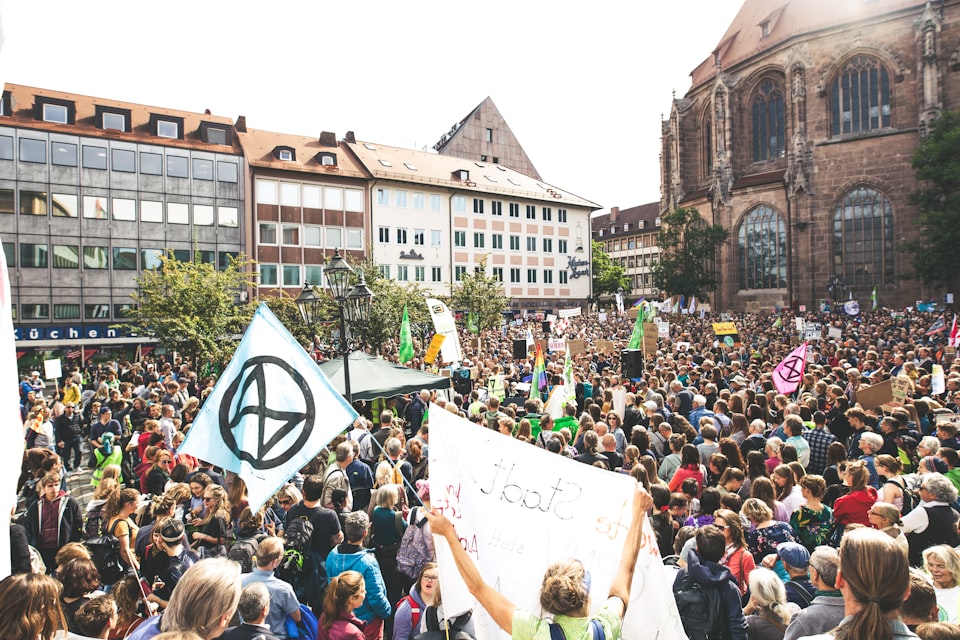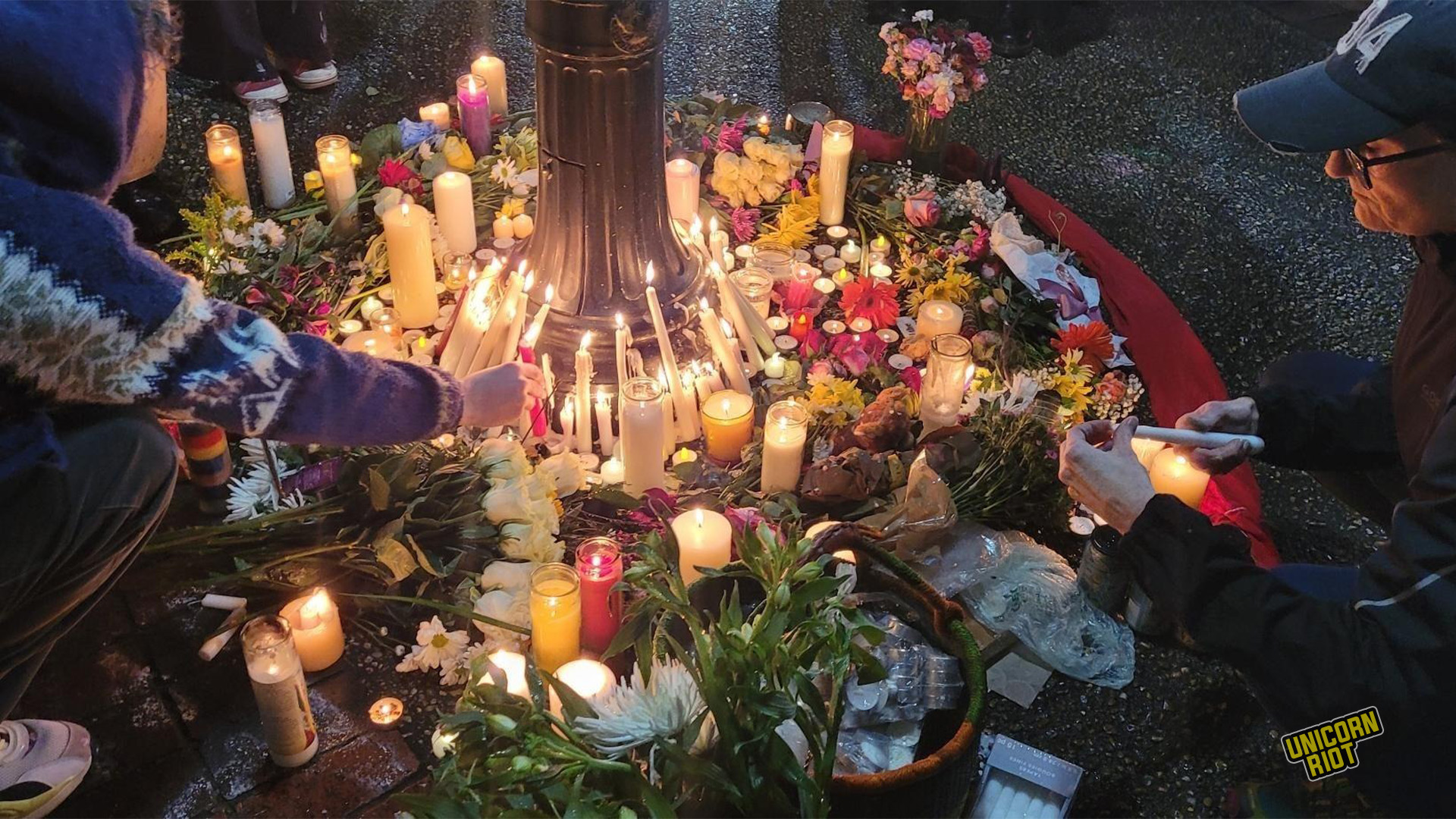Radical activism to defend the planet

Written by:
As the climate crisis intensifies and governments fail to respond to calls to protect the environment and curb fossil fuel emissions, citizens have embraced radical direct action, occupations, and mass protests. Authorities have responded with arrests and armed confrontation. In Atlanta, a recent melee between police and forest defenders turned lethal.
One organization at the forefront of climate activism has been Extinction Rebellion, or XR, which emerged in 2019 in London after occupying strategic locations throughout the city, including Oxford Circus, Marble Arch, Parliament Square, and Waterloo Bridge. Rather than flee from police, these nonviolent protesters welcomed arrest. They succeeded in pressuring the British government to declare a climate emergency, though it was largely a symbolic gesture.
At the end of 2022, the organization announced it had decided to “temporarily shift away from public disruption as a primary tactic” and called instead for 100,000 people to join in a mass protest in April.
ATMOS examines the controversial decision by the group, speaking with various XR members and calling attention to what it described as a failure of the movement to reckon with racism and other causes of oppression. “Without this understanding, the movement will never be able to tackle the climate crisis adequately no matter what their tactics,” writes Molly Lipson.

About the same time that XR was making its announcement, an effort by activists in Germany to stop the demolition of the hamlet of Lützerath to make way for the expansion of a coal mine was coming to a head. In early January, police arrested hundreds of protestors and evicted them from the area. Notable Swedish climate activist Greta Thunberg, who had joined the protesters, was among those who were detained, GRIST reports in a dispatch.

Meanwhile, in the U.S., law enforcement officers in Atlanta, Georgia, raided a forest to dislodge activists who had been occupying land planned for what had become known as Cop City, a proposed police training center. In the melee between forest defenders and police, officers shot and killed a forest demonstrator named Manuel Terán. Tort, or Tortuguita, as they were known, was a trained medic, UNICORN RIOT reports. Police say that Tortuguita shot and wounded a state trooper before being shot and killed by officers. Activists dispute the official account and have called for an independent investigation.

Gas stoves move to the forefront of the climate culture war
According to some on the conservative right, the gas stove appears to be worth dying for.
“If the maniacs in the White House come for my stove, they can pry it from my cold dead hands,” Rep. Ronny Jackson (R-Tenn.) tweeted in response to viral reports that the U.S. Consumer Product Safety Commission was evaluating a possible ban on the emissions-spewing appliances.
The White House clarified that a ban on gas stoves wasn’t happening, but a new front had already opened in the climate culture war.
Much to our collective benefit, HEATED examines why it even mattered to the climate conversation that so many people, from television pundits to your next door neighbor, were suddenly talking about gas stoves.
“The main importance of the gas stove conversation, from a climate perspective, is raising awareness of the quiet prevalence of methane leaks in our lives, and the harm those leaks cause people and the planet. If we’re not doing that, we’re missing the forest for the trees,” writes Emily Atkin.

Also in HEATED, Atkin takes a look at how the gas industry stoked the flames of this culture war in their marketing efforts.
Christian Downie on how fossil fuel trade associations stall climate action
Christian Downie is a political scientist and professor at the Australian National University, where he researches climate and energy politics. He is also the author of Business Battles in the U.S. Energy Sector. We spoke about a paper he recently published with co-author Robert Brulle in the journal Climatic Change that traces how fossil fuel trade associations in the U.S. are investing billions of dollars on political activities. Here’s an excerpt of our conversation, which I lightly edited for clarity.
Q: What led you to focus on U.S. fossil fuel trade associations?
A: They're really one of these big players in climate politics that not many people have looked at. And yet there's thousands and thousands of them across the U.S. Pretty much every sector has a trade association. And these organizations have played a huge role in shaping energy policy, climate policy for decades. And yet we know very little about what they do and about their political activities.
Q: What is the biggest finding of your paper?
A: What we wanted to know is where are they spending their money? So you've gotta remember that these trade associations have been active on climate change for decades. We know that, for example, when James Hanson, that very well-known NASA scientist, sounded the alarm on climate change in 1988, three well-known trade associations, the National Association of Manufacturers, the Edison Electric Institute, and the American Petroleum Institute, banded together to oppose regulations on climate emissions. So we wanted to see what's been happening in more recent years. And I guess the headline takeaway is that trade associations spent $3.4 billion in 10 years on political activities.
Q: What does your research mean for people trying to get governments to take action on climate change and to transition to a more sustainable economy?
A: I think our findings show that it's kind of concerning for advocates of climate change that those industries that have historically opposed climate policies have outspent those industries that typically support climate action like the renewable sector. I think it’s part of the explanation why it took Congress almost 35 years since NASA scientist James Hansen first warned representatives about the dangers of climate change to pass a major climate bill, that being the Inflation Reduction Act that we saw last year.
In Brief
A MATTER OF DEGREES speaks with climate experts about how increasing temperatures around the world are affecting people and the planet.

OptOut’s own Liana DeMasi, our LGBTQ+ editor, reports for ATMOS on how wild horses are contributing to the West’s drought conditions.

Reporter Rachel Donald interviews climate researcher Max Ali for her podcast, PLANET:CRITICAL, on how agrarian reform is essential to the transition away from our carbon-based economy.

Climate Agenda
UN 2023 Water Conference
March 22-24, 2023
New York, NY
2nd World Conference on Climate and Sustainability 2023
October 16-18, 2023
COP28
November 30, 2023 to December 12, 2023
United Arab Emirates
New York Clean Energy Calendar
Climate Jobs
Climate & Health Reporter (1 Year, Grant-Funded) (Remote, DC)
NPR News
Section Editor (Remote, London)
Carbon Brief
Associate, Projects and Partnerships (Remote)
Climate Nexus
Director of Programs and Climate Initiatives (NYC)
Waterfront Alliance
Program and Operations Specialist (NYC)
Empire Clean Cities
Also check out BROWN GIRL GREEN’s jobs board here.
Hit Me Up!
Thanks for reading OptOut’s climate newsletter! If you have questions, tips, or anything else about our climate program, feel free to email me at cristian@optout.news or message me via Instagram or Twitter at @xtianpublic.
We’ll see you in two weeks.
The OptOut Media Foundation (EIN: 85-2348079) is a nonprofit charity with a mission to educate the public about current events and help sustain a diverse media ecosystem by promoting and assisting independent news outlets and, in doing so, advance democracy and social justice.
Download the app for Apple and Android.
Sign up for OptOut's free newsletters.
Learn more about OptOut.
Follow us on Twitter, Instagram, TikTok, YouTube, Mastodon, and Facebook.












